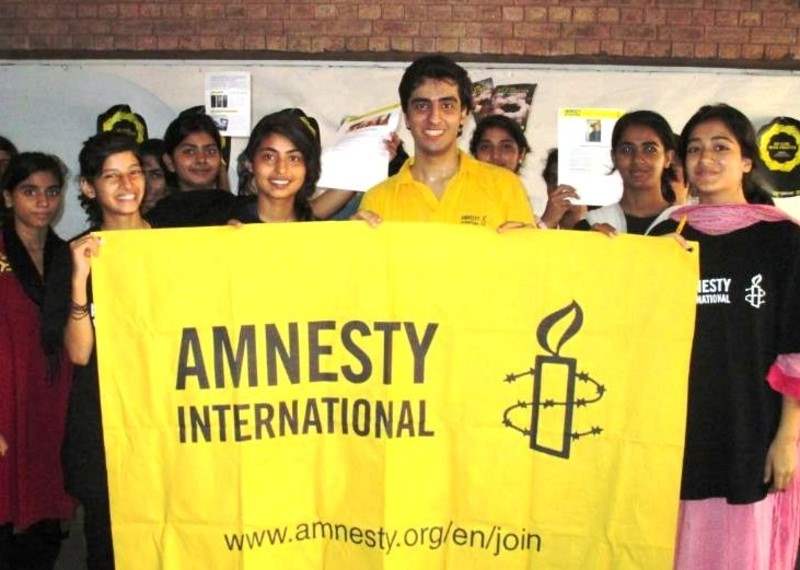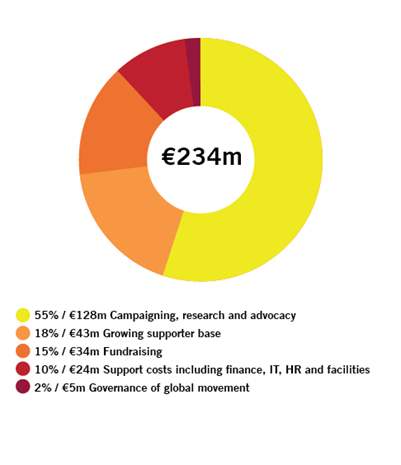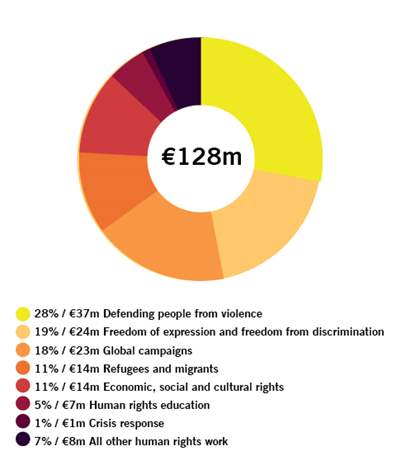For more than five decades, Amnesty International has shone a light on the world’s torture chambers and darkest corners – taking action and empowering others to expose and fight injustice globally.
In 2014, we documented human rights violations in 160 countries and territories. We bore witness, we campaigned, we advocated. We spoke out for justice, freedom and dignity.
We kept the spotlight of international attention on the world’s dictators, secret police, torturers and death squads.
We continued to build the long-term future of a truly global human rights movement – one that makes change happen wherever and whenever it is needed.
And we made a positive human rights difference.
All this was made possible thanks to the support and generosity of our members, supporters and donors. Thank you!
THIS GLOBAL FINANCE REPORT IS PART OF OUR COMMITMENT TO BE AS TRANSPARENT AND ACCOUNTABLE AS POSSIBLE.
Amnesty International

Impact
We know from long experience that every individual can make a difference – but millions standing together for freedom, justice and dignity can change the world.
We are always cautious about claiming credit for human rights victories, which often result from many factors and actions. We are usually one of many actors and local partners working on an issue. Securing justice – and offering hope to those whose rights are violated – is also harder to measure than, for example, development aid. Nor is impact always immediate – sometimes change can take years.
Yet there are many stories of change where we believe our contribution was significant.
Be inspired – read more: 24 of our biggest moments in 2014
2014 – despite being a bleak year for human rights – saw many remarkable victories for justice and freedom, and numerous stories of hope. Here are some of the highlights:

Impartial. Independent. Accurate.
Where our money comes from
Our deeply held core principles of impartiality, independence and accuracy underpin everything we do. This is built on an understanding that all rights must be respected together if we are to achieve a world free from fear and want.
In 2014, we raised €247m for human rights work, an increase from 2013 (€245m).
We received only one restricted donation over €1m: the Norwegian telethon who donated €5m for 2014 (in 2013, they donated €5.9m) which was earmarked for human rights research and campaigning across justice themes.
The vast majority of our income comes from small donations from private individuals.
Amnesty International
We believe, therefore, that we are not unduly influenced in setting our strategic and operational goals.
GLOBAL DONATIONS
More than 2,000,000 individuals donated to Amnesty International in 2014
We do not accept money from governments other than in very limited circumstances, including human rights education, which makes up less than 1% of our total income. We are fully independent of governments, political ideologies, economic interests and religions. Our work relies on individuals like you.

How we spend our money
Our global income is crucial to achieving human rights impact and change.
95% of this income is “unrestricted”. This means we are not asked to use it in a particular way – so we can spend most of our money wherever in the world the need is greatest.
We have the flexibility to respond quickly to emergencies such as the crisis in Syria.
Amnesty International
In 2014 our global expenditure was €234m (in 2013, it was €235). The pie chart shows the breakdown of what was spent.
GLOBAL ACTION
On 25 September, the European Commission in an unprecedented step announced that it would use its powers to initiate infringement proceedings against the Czech Republic for breaching European Union (EU) anti-discrimination legislation with respect to segregated education for Roma children. Amnesty International, together with other civil society partners, played a key role in encouraging the Commission to take action through a detailed submission based on evidence, gathered by the organisation for over a decade, of widespread unlawful discrimination against Romani children.

Research. Evidence. Action.
What we spend our money on
Our action for human rights is based on the foundations of high-quality research, evidence and legal analysis.
This is accompanied by effective campaigning action, international solidarity and relentless global pressure to insist that governments live up to the promises made in the Universal Declaration of Human Rights.
Our work covers the whole spectrum of human rights.
The top human rights issues we spent money on in 2014 were defending people from violence — including our work on the death penalty, the arms trade and international justice – and freedom of expression and freedom from discrimination – including our work on individuals at risk.
Almost 16,000,000 actions were taken on behalf of Amnesty International by its global activists in 2014.
Amnesty International
For more details on our financial statements, please click here.

